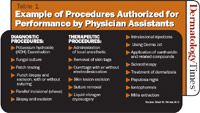- Case-Based Roundtable
- General Dermatology
- Eczema
- Chronic Hand Eczema
- Alopecia
- Aesthetics
- Vitiligo
- COVID-19
- Actinic Keratosis
- Precision Medicine and Biologics
- Rare Disease
- Wound Care
- Rosacea
- Psoriasis
- Psoriatic Arthritis
- Atopic Dermatitis
- Melasma
- NP and PA
- Skin Cancer
- Hidradenitis Suppurativa
- Drug Watch
- Pigmentary Disorders
- Acne
- Pediatric Dermatology
- Practice Management
- Prurigo Nodularis
- Buy-and-Bill
Article
Hiring extenders requires investment in training, but payoff worth price
National report - Dermatologists who currently employ physician extenders agree that when used appropriately, those nonphysician office personnel can be an enormous benefit to a dermatology practice.

However, adequate training and appropriate delegation are the keys to success.
"To dermatologists who are not now working with a physician extender, I would say the single greatest thing you can do to improve your quality of life is to hire one. Properly trained, the physician extender will render the type of care you would render and can help build rapport with patients that will show how you value your relationship with them," says David M. Pariser, M.D., professor of dermatology, Eastern Virginia Medical School, Norfolk, Va.

Dr. Nestor's group practice comprises 29 dermatologists working in 19 offices with 27 physician assistants (PAs) and two nurse practitioners (NPs). In the office where he works, there are four PAs as well as two medical assistants/estheticians. Dr. Pariser's group has three PAs and eight dermatologists distributed among five offices in Eastern Virginia.
Learning on the job
Both Dr. Nestor and Dr. Pariser point out that most physician extenders must undergo dermatology-specific training after they are hired. Academic training on dermatology topics is minimal.
For example, currently only a few PA schools are associated with a medical school and offer a PA residency in dermatology, while the PA degree program might include a few dermatology-related courses and perhaps several weeks of observation in a clinical rotation.

Currently, the AAD is working with the Society of Dermatology of Physician Assistants to discuss what might be the basic training that a PA would need to be considered a "dermatology PA."
"What we hope will be developed is a standardized program for training and education that will include a core curriculum covering medical and procedural topics and appropriate testing," Dr. Pariser says. "Then, each dermatologist can give the PAs they hire their own flavor of training based on their practice needs and the role of the PA. In the meantime, if you want to hire somebody to be a PA in your office, you will likely have to train that person yourself."
PAs hired in Dr. Pariser's practice undergo a six-month training program that is outlined in a manual he has developed and which he is willing to share with colleagues. The PA receives a salary during the training period and must sign a contract that includes a noncompete clause.





